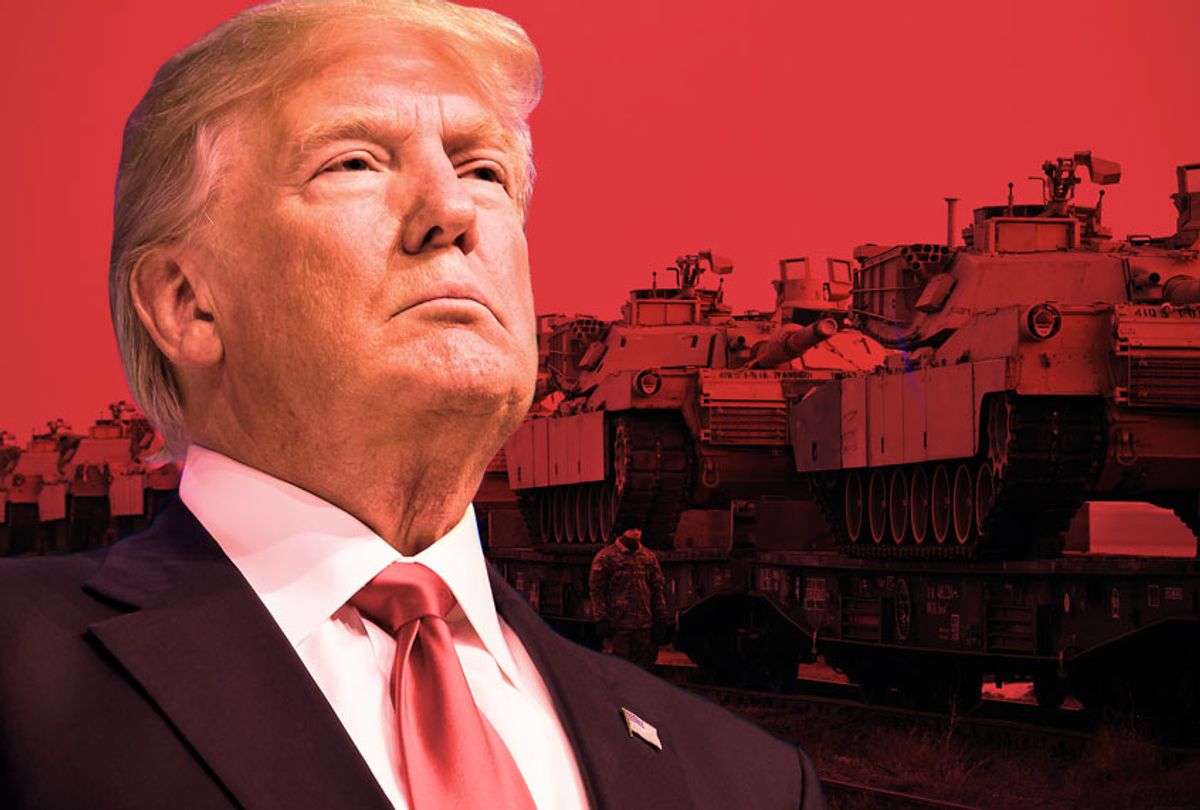From the floor of the House on Tuesday night during his State of the Union address, President Donald Trump boasted of his accomplishments in the war on terror that he inherited. He highlighted the near-defeat of the Islamic State, vowing to refill the prison at Guantanamo Bay, and put the world on notice that America would rebuild its nuclear arsenal.
The one thing he lacked was an exit strategy for the never-ending American military campaign that began more than 15 years ago.
Despite promises made by Trump on the campaign trail and while in office, the world will not be a safer place. Conflicts will continue; tensions will escalate; and the United States will continue to feel the ramifications of its endless foreign military interventions in Middle Eastern and African nations. On the international stage, things look bleaker than ever as Trump ramps up military operations afar, and pushes for policy that seals the borders at home.
Trump's speech also turned back the clock on the global fight against terrorism and explicitly promised to not only bring back the shadowy Bush-era tactics — some of which expanded throughout the Obama era — but on steroids. Worse yet, he proposed they would be done openly, brazenly and without question. Trump's political posturing on the global war on terror has been largely overlooked as Americans have grown to be further and further removed from the country's conflicts abroad.
Drone warfare
The impact Trump made, however, was immediate. After one year in office, Trump has dramatically escalated several U.S. conflicts abroad; civilian death tolls have skyrocketed. Under Trump, the controversial drone program "has resulted in more loss of life from drone strikes than all eight years of Obama’s presidency," according to Reprieve, an international human rights organization. "Trump ripped up the limited safeguards President Obama put in place. This is now industrial-scale executions, hugely expanded in both scale and callousness, conducted with no regard for human life or human rights."
The fight against ISIS
In the past year the U.S. has made serious gains on the ground against the ISIS, liberating the group's two primary strongholds in Mosul, Iraq, and Raqqa, Syria. But as Trump declared victory, he overlooked that Americans won't be able to extricate themselves anytime soon. And so, the question of a post-ISIS landscape is an open one.
U.S. military presence in Syria is now indefinite, Secretary of State Rex Tillerson announced in January. The wars the U.S. has engaged in no longer have timelines or clear-cut exit strategies, instead, presence is timeless, conflict is inevitable and the lines of the battlefield have dissolved to near-invisibility.
Operations in Africa
Across Africa, U.S. military operations have bloomed, and are predominantly conducted in clandestine fashion, with little public knowledge or debate. It's true, however, that this was a likely destiny with Trump at the helm or not, but his bombastic rhetoric and short-fused temperament certainly make the prospect all the more dangerous.
U.S. counterterrorism operations have spread throughout the continent in recent years, and are kept in almost complete secrecy, depriving the public of any knowledge for debate. Last October, four U.S. Special Forces soldiers were killed in an ambush along the border of Mali and Niger. In the wake of the incident, Trump cast the blame on his generals. He followed that up by engaging in a feud with the widow of one of the slain soldiers, Sgt. La David Johnson, over whether or not the president remembered the widow's husband's name.
Guantanamo Bay
The horrors of the U.S. military prison in Cuba, and the radicalization of its prisoners, are well-documented. Only 41 men remain in the prison, several of whom have never once been charged with a crime or promised a fair trial. Eight of those men are represented by Reprieve. Of course, Trump touted his reversal of an Obama-era executive order to close GITMO — something the 44th president never saw happen — and promised to send new faces to indefinite detention.
On the campaign trail Trump promised to bring back torture and go after the families of terrorists, something both he and his predecessor have already achieved.
Afghanistan
Now old enough to drive, the war that started the new global interventionist wave looks worse than it ever has before. The Taliban resurgence has been both fierce and predictable. Despite U.S. hopes to strike a deal with the Taliban in peace talks, Trump undercut the idea and said he would be unwilling to speak with the group. The amount in which the Taliban maintains control over Afghanistan has been disputed, but a recent BBC study found that Taliban fighters are active in 70 percent of the country.
Findings from the 38th quarterly report conducted by the Special Inspector General for Afghanistan Reconstruction (SIGAR) proved that despite Trump's escalations, little progress has been made.
"[T]he expanded authorities provided to U.S. forces in Afghanistan have resulted in a significant uptick in U.S. air strikes and special operations against the insurgency, with the U.S. dropping 653 munitions in October 2017, a record high since 2012 and a more than three-fold increase from October 2016," the report said. "These actions have yet to increase the Afghan government’s control over its population."
The endgame
Since the turn of the century, American wars have become a can for presidents to kick down the road — only to be mentioned in the broadest of terms, if at all.
All the while, Trump has eschewed diplomacy as a quiver in the American arsenal. He has shown no intention of reducing military expenditures. As he used tragedies for his political benefit, he's ignored right-wing extremism at home, letting it fester.



Shares